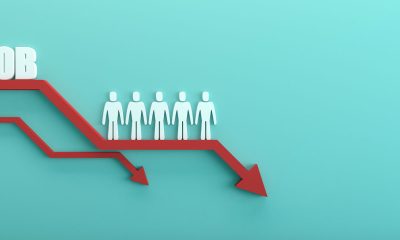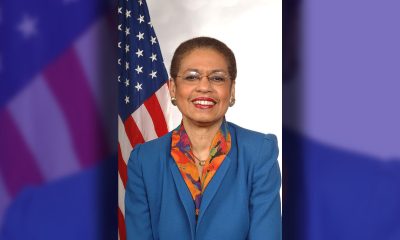Politics
Massive Data Breach Could Affect Every Federal Agency

This Feb. 24, 2015, file photo, shows the Homeland Security Department headquarters in northwest Washington. The Department of Homeland Security said in a statement Thursday, June 4, 2015, that data from the Office of Personnel Management and the Interior Department had been hacked. (AP Photo/Manuel Balce Ceneta, File)
KEN DILANIAN, Associated Press
RICARDO ALONSO-ZALDIVAR, Associated Press
WASHINGTON (AP) — China-based hackers are suspected once again of breaking into U.S. government computer networks, and the entire federal workforce could be at risk this time.
The Department of Homeland Security said in a statement that data from the Office of Personnel Management — the human resources department for the federal government — and the Interior Department had been compromised.
“The FBI is conducting an investigation to identify how and why this occurred,” the statement Thursday said.
The hackers were believed to be based in China, said Sen. Susan Collins, a Maine Republican.
Collins, a member of the Senate Intelligence Committee, said the breach was “yet another indication of a foreign power probing successfully and focusing on what appears to be data that would identify people with security clearances.”
But in Beijing Friday, the Chinese Foreign Ministry dismissed the allegations.
A spokesman for the ministry, Hong Lei said at a regular news briefing that Beijing hopes the U.S. would be “less suspicious and stop making any unverified allegations, but show more trust and participate more in cooperation.”
Beijing routinely dismisses any allegation of its official involvement in cyberattacks on foreign targets, while invariably noting that China is itself the target of hacking attacks and calling for greater international cooperation in combating hacking.
“We know that hacker attacks are conducted anonymously, across nations, and that it is hard to track the source,” Hong said. “It’s irresponsible and unscientific to make conjectural, trumped-up allegations without deep investigation.”
A U.S. official, who declined to be named because he was not authorized to publicly discuss the data breach, said the breach could potentially affect every federal agency. One key question is whether intelligence agency employee information was stolen. Former government employees are affected as well.
The Office of Personnel Management conducts more than 90 percent of federal background investigations, according to its website.
The agency said it is offering credit monitoring and identity theft insurance for 18 months to individuals potentially affected. The National Treasury Employees Union, which represents workers in 31 federal agencies, said it is encouraging members to sign up for the monitoring as soon as possible.
In November, a former DHS contractor disclosed another cyberbreach that compromised the private files of more than 25,000 DHS workers and thousands of other federal employees.
Cybersecurity experts also noted that the OPM was targeted a year ago in a cyberattack that was suspected of originating in China. In that case, authorities reported no personal information was stolen.
Chinese groups have persistently attacked U.S. agencies and companies, including insurers and health-care providers, said Adam Meyers, vice president for intelligence at Irvine, California-based CrowdStrike, which has studied Chinese hacking groups extensively.
The Chinese groups may be looking for information that can be used to approach or compromise people who could provide useful intelligence, Meyers said. “If they know someone has a large financial debt, or a relative with a health condition, or any other avenues that make them susceptible to monetary targeting or coercion, that information would be useful.”
One expert said hackers could use information from government personnel files for financial gain. In a recent case disclosed by the IRS, hackers appear to have obtained tax return information by posing as taxpayers, using personal information gleaned from previous commercial breaches, said Rick Holland, an information security analyst at Forrester Research.
“Given what OPM does around security clearances, and the level of detail they acquire when doing these investigations, both on the subjects of the investigations and their contacts and references, it would be a vast amount of information,” Holland added.
DHS said its intrusion detection system, known as EINSTEIN, which screens federal Internet traffic to identify potential cyberthreats, identified the hack of OPM’s systems and the Interior Department’s data center, which is shared by other federal agencies.
It was unclear why the EINSTEIN system didn’t detect the breach until after so many records had been copied and removed.
“DHS is continuing to monitor federal networks for any suspicious activity and is working aggressively with the affected agencies to conduct investigative analysis to assess the extent of this alleged intrusion,” the statement said.
Cybersecurity expert Morgan Wright of the Center for Digital Government, an advisory institute, said EINSTEIN “certainly appears to be a failure at this point. The government would be better off outsourcing their security to the private sector where’s there at least some accountability.”
Senate Intelligence Committee Chairman Richard Burr, R-N.C., said the government must overhaul its cybersecurity defenses. “Our response to these attacks can no longer simply be notifying people after their personal information has been stolen,” he said. “We must start to prevent these breaches in the first place.”
___
Associated Press writers Donna Cassata, Alicia A. Caldwell and Kevin Freking in Washington, Brandon Bailey in San Francisco and Ian Mader in Beijing contributed to this report.
___
Follow Ken Dilanian on Twitter at https://twitter.com/KenDilanianAP
Copyright 2015 The Associated Press. All rights reserved. This material may not be published, broadcast, rewritten or redistributed.
Activism
Oakland Post: Week of December 24 – 30, 2025
The printed Weekly Edition of the Oakland Post: Week of – December 24 – 30, 2025

To enlarge your view of this issue, use the slider, magnifying glass icon or full page icon in the lower right corner of the browser window.
Alameda County
Oakland Council Expands Citywide Security Cameras Despite Major Opposition
In a 7-1 vote in favor of the contract, with only District 3 Councilmember Carroll Fife voting no, the Council agreed to maintain its existing network of 291 cameras and add 40 new “pan-tilt-zoom cameras.”

By Post Staff
The Oakland City Council this week approved a $2.25 million contract with Flock Safety for a mass surveillance network of hundreds of security cameras to track vehicles in the city.
In a 7-1 vote in favor of the contract, with only District 3 Councilmember Carroll Fife voting no, the Council agreed to maintain its existing network of 291 cameras and add 40 new “pan-tilt-zoom cameras.”
In recent weeks hundreds of local residents have spoken against the camera system, raising concerns that data will be shared with immigration authorities and other federal agencies at a time when mass surveillance is growing across the country with little regard for individual rights.
The Flock network, supported by the Oakland Police Department, has the backing of residents and councilmembers who see it as an important tool to protect public safety.
“This system makes the Department more efficient as it allows for information related to disruptive/violent criminal activities to be captured … and allows for precise and focused enforcement,” OPD wrote in its proposal to City Council.
According to OPD, police made 232 arrests using data from Flock cameras between July 2024 and November of this year.
Based on the data, police say they recovered 68 guns, and utilizing the countywide system, they have found 1,100 stolen vehicles.
However, Flock’s cameras cast a wide net. The company’s cameras in Oakland last month captured license plate numbers and other information from about 1.4 million vehicles.
Speaking at Tuesday’s Council meeting, Fife was critical of her colleagues for signing a contract with a company that has been in the national spotlight for sharing data with federal agencies.
Flock’s cameras – which are automated license plate readers – have been used in tracking people who have had abortions, monitoring protesters, and aiding in deportation roundups.
“I don’t know how we get up and have several press conferences talking about how we are supportive of a sanctuary city status but then use a vendor that has been shown to have a direct relationship with (the U.S.) Border Control,” she said. “It doesn’t make sense to me.”
Several councilmembers who voted in favor of the contract said they supported the deal as long as some safeguards were written into the Council’s resolution.
“We’re not aiming for perfection,” said District 1 Councilmember Zac Unger. “This is not Orwellian facial recognition technology — that’s prohibited in Oakland. The road forward here is to add as many amendments as we can.”
Amendments passed by the Council prohibit OPD from sharing camera data with any other agencies for the purpose of “criminalizing reproductive or gender affirming healthcare” or for federal immigration enforcement. California state law also prohibits the sharing of license plate reader data with the federal government, and because Oakland’s sanctuary city status, OPD is not allowed to cooperate with immigration authorities.
A former member of Oakland’s Privacy Advisory Commission has sued OPD, alleging that it has violated its own rules around data sharing.
So far, OPD has shared Flock data with 50 other law enforcement agencies.
Activism
Families Across the U.S. Are Facing an ‘Affordability Crisis,’ Says United Way Bay Area
United Way’s Real Cost Measure data reveals that 27% of Bay Area households – more than 1 in 4 families – cannot afford essentials such as food, housing, childcare, transportation, and healthcare. A family of four needs $136,872 annually to cover these basic necessities, while two adults working full time at minimum wage earn only $69,326.

By Post Staff
A national poll released this week by Marist shows that 61% of Americans say the economy is not working well for them, while 70% report that their local area is not affordable. This marks the highest share of respondents expressing concern since the question was first asked in 2011.
According to United Way Bay Area (UWBA), the data underscores a growing reality in the region: more than 600,000 Bay Area households are working hard yet still cannot afford their basic needs.
Nationally, the Marist Poll found that rising prices are the top economic concern for 45% of Americans, followed by housing costs at 18%. In the Bay Area, however, that equation is reversed. Housing costs are the dominant driver of the affordability crisis.
United Way’s Real Cost Measure data reveals that 27% of Bay Area households – more than 1 in 4 families – cannot afford essentials such as food, housing, childcare, transportation, and healthcare. A family of four needs $136,872 annually to cover these basic necessities, while two adults working full time at minimum wage earn only $69,326.
“The national numbers confirm what we’re seeing every day through our 211 helpline and in communities across the region,” said Keisha Browder, CEO of United Way Bay Area. “People are working hard, but their paychecks simply aren’t keeping pace with the cost of living. This isn’t about individual failure; it’s about policy choices that leave too many of our neighbors one missed paycheck away from crisis.”
The Bay Area’s affordability crisis is particularly defined by extreme housing costs:
- Housing remains the No. 1 reason residents call UWBA’s 211 helpline, accounting for 49% of calls this year.
- Nearly 4 in 10 Bay Area households (35%) spend at least 30% of their income on housing, a level widely considered financially dangerous.
- Forty percent of households with children under age 6 fall below the Real Cost Measure.
- The impact is disproportionate: 49% of Latino households and 41% of Black households struggle to meet basic needs, compared to 15% of white households.
At the national level, the issue of affordability has also become a political flashpoint. In late 2025, President Donald Trump has increasingly referred to “affordability” as a “Democrat hoax” or “con job.” While he previously described himself as the “affordability president,” his recent messaging frames the term as a political tactic used by Democrats to assign blame for high prices.
The president has defended his administration by pointing to predecessors and asserting that prices are declining. However, many Americans remain unconvinced. The Marist Poll shows that 57% of respondents disapprove of Trump’s handling of the economy, while just 36% approve – his lowest approval rating on the issue across both terms in office.
-

 #NNPA BlackPress4 weeks ago
#NNPA BlackPress4 weeks agoLIHEAP Funds Released After Weeks of Delay as States and the District Rush to Protect Households from the Cold
-

 Activism4 weeks ago
Activism4 weeks agoOakland Post: Week of November 26 – December 2, 2025
-

 Alameda County3 weeks ago
Alameda County3 weeks agoSeth Curry Makes Impressive Debut with the Golden State Warriors
-

 #NNPA BlackPress4 weeks ago
#NNPA BlackPress4 weeks agoSeven Steps to Help Your Child Build Meaningful Connections
-

 #NNPA BlackPress4 weeks ago
#NNPA BlackPress4 weeks agoSeven Steps to Help Your Child Build Meaningful Connections
-

 #NNPA BlackPress4 weeks ago
#NNPA BlackPress4 weeks agoTrinidad and Tobago – Prime Minister Confirms U.S. Marines Working on Tobago Radar System
-

 #NNPA BlackPress4 weeks ago
#NNPA BlackPress4 weeks agoThanksgiving Celebrated Across the Tri-State
-

 #NNPA BlackPress4 weeks ago
#NNPA BlackPress4 weeks agoTeens Reject Today’s News as Trump Intensifies His Assault on the Press
















































